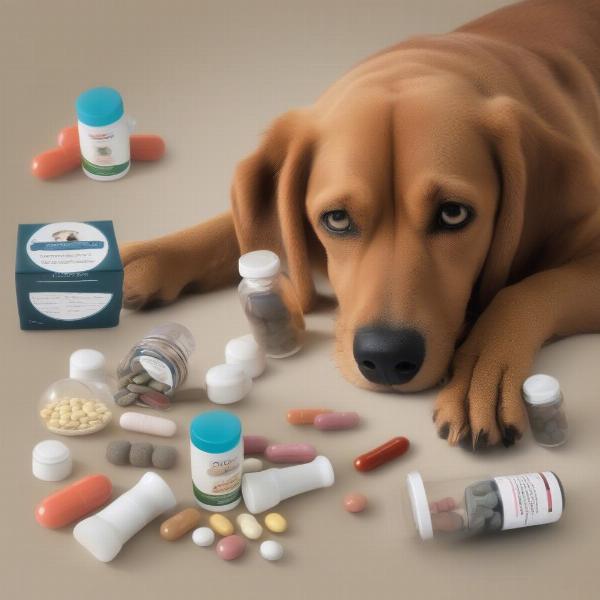Cushing’s disease, or hyperadrenocorticism, is a common endocrine disorder in dogs, often requiring lifelong management. While conventional veterinary treatments are essential, many owners explore dog supplements for Cushing’s to support their furry friends. This guide delves into the potential benefits, risks, and important considerations surrounding using supplements alongside traditional Cushing’s treatment.
Understanding Cushing’s Disease and the Role of Supplements
Cushing’s disease occurs when the adrenal glands overproduce cortisol, a vital hormone. This excess cortisol leads to a cascade of symptoms, including increased thirst and urination, a pot-bellied appearance, hair loss, and skin thinning. While medications are the primary treatment, dog supplements for Cushing’s can potentially help manage some symptoms and support overall well-being. It’s crucial to remember that supplements are not a cure for Cushing’s and should never replace prescribed medications. They are best used as a complementary therapy under the guidance of a veterinarian.
Potential Benefits of Dog Supplements for Cushing’s
Several supplements may offer benefits for dogs with Cushing’s. These include:
- Adaptogens: Herbs like Ashwagandha and Rhodiola are known to help the body adapt to stress, which can be beneficial in managing the effects of elevated cortisol.
- Antioxidants: Supplements rich in antioxidants, such as Vitamin E and Vitamin C, can help protect cells from damage caused by oxidative stress, a common consequence of Cushing’s.
- Liver Support Supplements: Milk thistle and SAM-e are often recommended to support liver function, as the liver plays a crucial role in metabolizing excess cortisol.
- Skin and Coat Supplements: Omega-3 fatty acids, found in fish oil, can help improve skin and coat health, which is often compromised in dogs with Cushing’s.
 Various Dog Supplements for Cushing's Disease
Various Dog Supplements for Cushing's Disease
Risks and Considerations
While supplements can be helpful, it’s crucial to be aware of potential risks:
- Drug Interactions: Some supplements can interact with prescribed medications, so it’s essential to consult with your veterinarian before starting any new supplement.
- Quality Control: The supplement industry is not strictly regulated, so choosing high-quality products from reputable manufacturers is vital.
- Dosage: Correct dosage is crucial. Too little may be ineffective, while too much can be harmful. Always follow your veterinarian’s recommendations.
Choosing the Right Supplements
Selecting the right dog supplements for Cushing’s requires careful consideration. Discuss your dog’s individual needs and current medications with your veterinarian. They can help you choose appropriate supplements and determine the correct dosage. Look for supplements that have undergone third-party testing for purity and potency.
How Can Supplements Help My Dog with Cushing’s-Related Hair Loss?
Supplements containing Omega-3 fatty acids and specific vitamins can support skin and coat health, potentially minimizing hair loss associated with Cushing’s disease.
What are the Most Important Things to Consider Before Giving My Dog Supplements for Cushing’s?
Always consult your veterinarian before starting any new supplements to ensure compatibility with existing medications and discuss appropriate dosages. Prioritize high-quality supplements from reputable manufacturers.
Conclusion
Dog supplements for Cushing’s can be a valuable addition to a comprehensive treatment plan. However, they should always be used under the guidance of a veterinarian. By working closely with your vet and choosing high-quality supplements, you can help support your dog’s overall well-being and manage some of the challenging symptoms of Cushing’s disease.
FAQs
- Can supplements cure Cushing’s disease in dogs? No, supplements are not a cure. They can support overall health but should not replace prescribed medications.
- Are all dog supplements safe for dogs with Cushing’s? No, some supplements can interact with medications. Always consult your veterinarian.
- How do I choose the right supplements for my dog? Work with your veterinarian to determine which supplements are appropriate for your dog’s individual needs and medical history.
- What should I look for in a quality dog supplement? Look for supplements from reputable manufacturers that have undergone third-party testing.
- Can I give my dog human supplements? No, never give your dog human supplements without consulting your veterinarian. Dosages and formulations can be very different.
- How long does it take to see results from supplements? Results can vary depending on the supplement and the individual dog. It may take several weeks or months to see noticeable improvements.
- What are the signs of a supplement overdose in dogs? Signs can vary depending on the supplement. Contact your veterinarian immediately if you suspect your dog has overdosed on a supplement.
ILM Dog is a leading online resource dedicated to providing dog owners worldwide with reliable, practical information on all aspects of dog care. We offer expert advice on dog breeds, health, training, nutrition, grooming, activities, and much more. From puppy care to senior dog care, we cover it all. For professional guidance tailored to your dog’s needs, contact us at [email protected] or +44 20-3965-8624. ILM Dog is here to support you and your furry companion every step of the way.